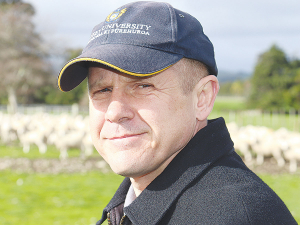Breeding Ewe Hoggets: Key tips for maximising lamb survival and farm profitability
With lamb prices at record highs, many farmers are considering breeding their ewe hoggets for the first time.
 Paul Kenyon believes students have learned to be more self-reliant and independent because during lockdown they had to learn by themselves.
Paul Kenyon believes students have learned to be more self-reliant and independent because during lockdown they had to learn by themselves.
Massey University's School of Agriculture and Environment head says in the future it's likely that more students will do their degrees part time.
Professor Paul Kenyon's comments follow the graduation of the first cohort of students who have had all three years of their degree study disrupted in some way by Covid-19. Kenyon says despite these disruptions, he's confident that these students have the same knowledge as those who gained their degrees pre Covid.
"Their marks certainly indicate this," he told Rural News.
Kenyon says this latest cohort of students have developed new skills and traits that will set them up for successful careers in the new digital environment. He believes they have learned to be more self-reliant and independent because during lockdown they had to learn by themselves and are well set up for their future careers.
"In terms of the practical aspect of their degrees, this was only reduce a bit 2020 and 2021 and it's now back to normal," Kenyon explains. "But as with all distance and external students block courses were arranged, so that they could complete their practical work."
He adds that Massey students also do placements on farm and orchards during their holiday breaks to hone their skills and make them 'work ready'.
Kenyon believes that, going forward, the trend towards distance learning will likely grow.
He says the cost of education is rising and it's possible some students will stay in their local areas, work in the ag sector and do their degrees part time. For many students this will be a cheaper option.
He says Massey has always specialised in distance education and as a university was relatively well prepared for changes that were forced on it by Covid.
Meanwhile, this year's top Massey Ag students were honoured at a special ceremony recently. The top prize - the William Gerrish Award - was won by Adam Honeyfield, a Bachelor of Agribusiness student from Tauranga. He is majoring in rural valuation, grew up on a farm, and now works part-time for a rural valuation company in Tauranga while he finishes his degree.
Honeyfield says he was humbled to receive the award.
"I was quite surprised to be honoured," he told Rural News. "It's been a long journey for me - four years of hard work by distance, so it's a nice way to wrap things up. The hard work has all paid off," he says.
The other top students were Ingeborg Smythe (Earth Science), Joanna Wood (Environmental Science), Lachlan Barrett (Horticultural Science), Erika Lilley (Agriculture) and Brooklynn Taylor (Animal Science).
New Zealand potato growers are prioritising value creation from high yields to meet a complex mix of challenges and opportunities, says Potatoes NZ chief executive Kate Trufitt.
A Hawke's Bay apple orchardist supports the Government's objective of doubling exports but says this won't happen in the horticulture sector unless there's a change in the process for bringing new plant material into the country.
Canterbury arable farmers are down by tens of millions of dollars after a rollercoaster of wild changeable January weather saw harvests delayed and some crops destroyed by violent hailstorms.
Could a breakthrough in fermentation create a new multi-million-dollar export market for shiitake mushroom extracts into China?
Meadow Fresh has created the world's first fantasy sports league powered by real cows.
This year, 'Foodie February' sees potatoes take the spotlight as one of New Zealand's most powerful and versatile food heroes.

OPINION: Meanwhile, red blooded Northland politician Matua Shane Jones has provided one of the most telling quotes of the year…
OPINION: This old mutt has been around for a few years now and it seems these ‘once in 100-year’ weather…